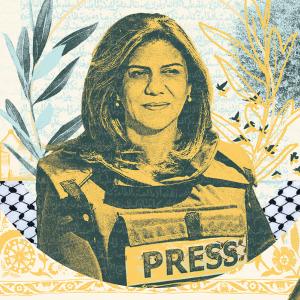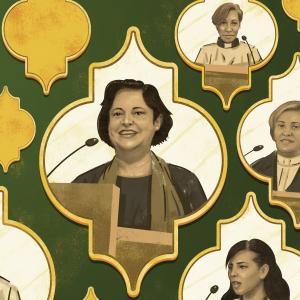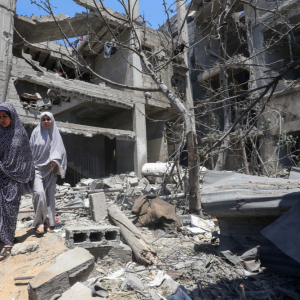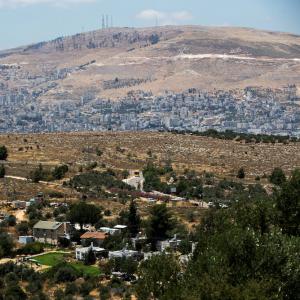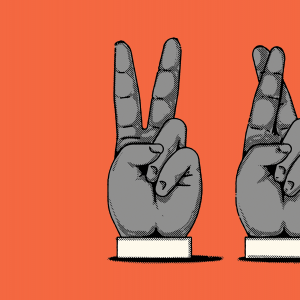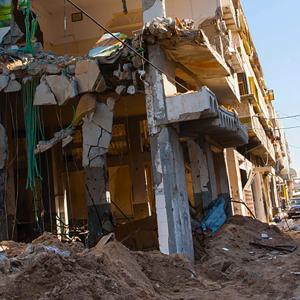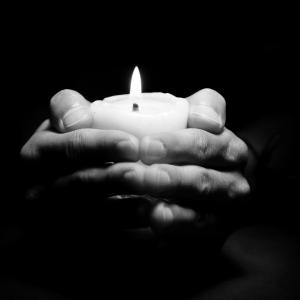
Mae Elise Cannon is ordained in Word and Sacrament in the Evangelical Covenant Church. She serves as executive director of Churches for Middle East Peace and is the author of several books, including A Land Full of God: Christian Perspectives on the Holy Land.
Posts By This Author
Lord, When Did We See You Thirsty in Gaza?
IN THE MIDDLE East, water is more than a resource. Water is a source of power, and in many cases, a weapon of war. The Gaza Strip is the most urgent and devastating example.
The survival of Ahmad (whose last name we have withheld for security reasons), like hundreds of thousands of others in Gaza, depends on gaining access to basic humanitarian resources, especially water.
“Sometimes a water truck comes to our area, so we fill some gallons. When it doesn’t, we’re forced to drink regular water,” Ahmad told us and our colleagues at Churches for Middle East Peace over WhatsApp in July. The “regular water” he refers to is untreated groundwater pulled from local wells, risky to consume even before the most recent war. “My body didn’t take it. I got very sick,” he told us. “But we had no other option.”
These Forgotten Christians Know What It’s Like To Be Without a Country
How what’s happening in the Armenian community speaks to the broader struggle of living under Israeli occupation in East Jerusalem and beyond.
JERUSALEM'S OLD CITY has often been a focal point of the Israeli-Palestinian conflict, but within its walls lies a lesser-known story of occupation and resilience. The Armenian Quarter, a Christian enclave that has endured for centuries, now finds itself under threat.
In the context of occupied East Jerusalem, where Palestinians continually face displacement and erasure of their cultural and physical presence, the Armenian community’s struggle reflects a larger pattern. Though they make up a small portion of the city’s population, Armenians have called Jerusalem home for more than 1,700 years, surviving waves of conflict and colonial powers.
As a critical component of a shared Jerusalem between Jews, Christians, and Muslims, the Armenian Quarter has been a haven for this Christian community since a group of Armenian monks and priests established St. James monastery there in 420 C.E.
The enclave is now fighting to preserve its heritage amid mounting pressures. In April 2023, the community was shaken by plans from an Israeli-Australian developer, Xana Capital, to construct a luxury hotel on land purportedly owned by the Armenian Patriarchate. This development mirrors the land confiscation and settlement expansion that Palestinians know all too well.
Like the rest of the Christian population in the Old City, including the Greek Orthodox, Roman Catholic, and Ethiopian Orthodox, the Armenian community is navigating increased challenges, from economic strain to political pressures and demands to shift the historic status quo. These communities, increasingly pressured by Israeli authorities and settlers, face a myriad of problems, including property disputes, confiscation of church lands, new and prejudicial tax demands, and occasional acts of vandalism against religious sites. All Christian groups are grappling to maintain their historical presence in the face of growing threats in this contested city.
The Fearless Pursuit of Justice for Shireen Abu Akleh
The killing of a renowned Palestinian American journalist shines a light on Israeli military practices in the Occupied Territories.
PALESTINIAN AMERICAN JOURNALIST Shireen Abu Akleh was shot and killed in May 2022 while covering an Israel Defense Forces raid on a refugee camp in the Palestinian West Bank village of Jenin. Abu Akleh had been standing with a group of other journalists and was wearing a blue vest with the word PRESS printed across it when she was shot; her producer was shot in the back but survived. Hours after Abu Akleh’s death, Israeli police went into her home, took away Palestinian flags, and prevented the singing of Palestinian nationalist songs.
In mid-November, the FBI opened an investigation into Abu Akleh’s death; Israeli Defense Minister Benny Gantz said Israel would refuse to cooperate since, Gantz said, the IDF had already investigated the IDF actions in the shooting. The U.S. State Department commented, “Not only was Shireen an American citizen, she was a fearless reporter whose journalism and pursuit of truth earned her the respect of audiences around the world.”
Before her death, households throughout the Arab world knew Abu Akleh’s work. Nicknamed “the daughter of Palestine” — and “the voice of Palestine” — Abu Akleh had worked for Qatar-based news outlet Al Jazeera for a quarter century. Viewed as courageous and thoughtful, Abu Akleh inspired many, including women interested in pursuing a career in journalism in the Middle East. A common signoff for her broadcasts summarized her motivation for being a journalist: “I chose journalism to be close to people. It might not be easy to change the reality, but at least I can bring their voices to the world. I am Shireen Abu Akleh.”
Women in the Middle East Claim Their Place in the Pulpit
In the region, as elsewhere, the stained-glass ceiling is beginning to crack.
FOR YEARS, WOMEN called to leadership in the church in the Middle East have faced a stained-glass ceiling of limitations imposed by the surrounding patriarchal culture and theological presuppositions about the role of women in the church. But while some interpretations of Paul’s instructions to the early church (such as Timothy 2:12) are used as a rationale for limiting the role of women, long-standing cultural traditions regarding women’s roles in religion and society have played a more prominent, and more difficult, role.
“Although religion bears major responsibility for the inferior status of women, it cannot be solely blamed for the gender problem in the Middle East,” according to a report on “Women in the Middle East” published by the Institute for Policy Studies. “In reality, the role of culture has been even more prominent in perpetuating the oppression of women.”
Most denominations in the Middle East (other than Orthodox communions and the Catholic Church) do not prevent the ordina-tion of women for theological reasons. And many Protestant communions, such as the Lutherans and Presbyterians—which have been present in the Middle East since 19th century missionary encounters—ordain women in churches around the world. While Orthodox churches do not have women in positions of clerical leadership, Father George Massouh, then-head of the Center for Christian-Muslim Studies at the University of Balamand in Lebanon, explained in 2017 that the reason is not because of “theological hindrance.” Rather, Massouh said, the absence of ordained women in Eastern churches “was due to social customs”—the Orthodox church, he said, “has no such tradition, whether in Lebanon or anywhere else in the world.”
U.S. Christians Can’t Ignore Israel’s Ongoing Occupation of Palestine
By May 14, reports indicated that at least 122 Palestinians, including 31 minors, had been killed and more than 900 wounded since May 10. In Israel, at least seven people were killed, including one child. While the immediate violence must be brought to an end, the realities of the ongoing Israeli occupation of Palestine cannot be ignored.
Assyrian Christians Caught Amid Geopolitical Conflicts
As tensions worsen between Iraq, Iran, Syria, and the U.S., the threat of extermination rises again.
IN 2019, I met with leaders from the Nahla Valley in Iraqi Kurdistan whose eight villages are both Muslim and Christian. Entire villages had been forced to evacuate when they were caught in the crossfire between rocket attacks launched from Turkey against Kurdish militias in northern Iraq. Children and community members were traumatized.
This February, border communities in northern Iraq were attacked again, this time by militants using Iranian-supplied weapons. Several rockets exploded in Irbil, the capital of Iraqi Kurdistan. One rocket hit the U.S.-led coalition military base, killing a civilian contractor from the Philippines and injuring at least six others. Many interpret the Irbil attack as a test of the Biden administration’s Iran policy, which seeks to revive the nuclear deal scrapped under the previous U.S. administration. President Joe Biden retaliated with airstrikes targeting Iranian-backed militias on the border in Syria—killing 22 people. The minority communities, including Christians, living in the Kurdish regions of neighboring Turkey, Syria, and Iraq continue to be caught in the middle as geopolitical conflicts escalate.
Christian Leaders Call on U.S. Political Parties to Address Palestinian Rights
The government of Israel could soon begin formally annexing a significant portion of the West Bank. As the leader of an ecumenical and nonpartisan organization focused on advocating for a just and lasting end to the conflict in Israel-Palestine, I am deeply worried annexation will entrench inequalities and abuses of Palestinian human rights.
Art of the Bad Deal
A Palestinian state is as necessary for peace as a secure Israel.
IN JERUSALEM'S OLD CITY, prices are seldom posted. Negotiating is not only welcomed but necessary. It is customary for the merchant to initially ask for a price far in excess of what both parties know to be reasonable. When such an offer is made, it is perfectly valid for the customer to reject the offer; only then does the real negotiation begin. But if the merchant’s counteroffers get progressively higher, it is perfectly justifiable for the customer to question whether the vendor is genuinely interested in selling.
For the past 30 years, the Israeli-Palestinian peace process has often resembled a dysfunctional bazaar transaction. With each round of negotiations, Palestinians have been asked to pay a higher and higher price. The Trump administration plan released in June, called “Peace to Prosperity,” is no exception. But why are its terms so unacceptable to Palestinians?
Palestinian political leadership has consistently expressed its aim to establish a sovereign state in which the Palestinian people can exercise national self-determination. As Israeli-Palestinian peace talks over the past quarter century have demonstrated, the issues of borders, Israeli settlements, and Jerusalem are all negotiable to some extent, but any plan that requires Palestinians to relinquish the fundamental aim of national sovereignty is setting the price too high.
A Capital Offense
Why Christians in the Middle East aren't celebrating the new U.S. Embassy in Jerusalem
EVANGELICALS IN THE United States and Christians in the Middle East had vastly differing responses to President Trump’s actions on Jerusalem that sparked the explosion of violence this spring on Gaza’s border with Israel.
In the United States, 53 percent of evangelicals supported the decision to recognize Jerusalem as the capital of Israel, according to a Brookings Institute poll, and it was greeted with unadulterated joy by prominent leaders of the Religious Right. A wide range of church leaders in the Middle East were decidedly less positive about Trump’s actions, pointing to the potential threat not only to peace in the region but also to the very presence of Christians in the Holy Land.
How could an action so many U.S. Christians supported elicit such opposition from Christians across the denominational landscape of the Middle East?
There are, of course, deep divides within Christianity about the place of the Holy Land and role of the Jewish people in eschatology that in part explain the divergent reactions, but there are pragmatic reasons as well for why Middle Eastern Christians would oppose the Trump administration’s actions on Jerusalem. The U.S. government’s recognition of Jerusalem as the capital of Israel—absent a peace agreement between Israelis and Palestinians—will certainly threaten the Christian presence in the city and increase the risk of violence, according to church leaders there, owing to the unilateral nature of the decision.
Supporters of U.S. recognition of Jerusalem might ask how this seemingly symbolic act could harm Christians (or anyone, for that matter). The Trump administration, after all, denies that the recognition of Jerusalem will have any detrimental impact on the peace process. They argue that Jerusalem has served as the physical location of Israel’s government since 1950; it makes no sense, they say, to deny the reality that the city is “in fact” Israel’s capital.
Life Inside the Gaza Blockade
The blockade of Gaza has created a humanitarian crisis, and hopelessness. But the outside world has the power to offer a lifeline.
MOST CHRISTIANS KNOW about Gaza from its mention in the Hebrew scriptures in the sensuous and heroic stories of Samson, corrupted by Delilah, who lured him into showing the secret of his strength (Judges 16:5). Historically a Canaanite city and then Philistine, Gaza was conquered by Joshua as a part of his conquest of the Promised Land (Joshua 10:41). For thousands of years Gaza has had a history of being destroyed and rebuilt, from the time of Alexander the Great until today.
The Gaza Strip is now a small territory to the southwest of Israel, bordered on the west by the Mediterranean Sea, with 1.8 million people living in only 140 square miles. During my visit there earlier this year, I was overwhelmed by the place’s incredible beauty; at the same time, the lack of functional sewage treatment plants, limited electricity, and other broken infrastructure result in Gazans experiencing a severe humanitarian crisis. Beautiful and tragic.
In 1967, the Israeli military seized Gaza and remained there until 2005, when Israel unilaterally pulled out under Ariel Sharon’s “disengagement” plan. Between August and September 2005, roughly 9,000 Israeli settlers were evacuated and 21 settlements destroyed (rather than turned over to Gazans). In 2007, after Hamas took control of Gaza, Israel intensified the restriction of movement and imposed land, sea, and air blockades on the territory. The blockades have led to severe living conditions for the people there and a growing humanitarian crisis.
Forgive Us, Lord
Often we do not know how our words and actions affect and harm others. However, ignorance is not an excuse. As the body of Christ, we must be willing to look deeply at the implications of the choices we make. When those choices cause harm – intentionally or unintentionally – we must repent and ask for forgiveness.
Forgive Us: Confessions of a Compromised Faith was a cry from my heart and the hearts of my coauthors as we wrestled with what it means to be the church of “Good News” in the 21st century. So many people do not see the evangelical church from that perspective. The church – rather than being Good News – is often a painful place where broken people, judgment, and criticisms prevail.
Full-Body Repentance
"Forgive Us," by Mae Elise Cannon, Lisa Sharon Harper, Troy Jackson, and Soong-Chan Rah
THE CRY OF the church to the world should be “Forgive us.”
At a time when the American church struggles with finding its place in the world and struggles with asserting its identity, could the church be known as the community that models confession, repentance, and the seeking of forgiveness? At this moment in history, the American church is often ridiculed or portrayed as unforgiving and ungracious. Could the church offer a counter-narrative, not of defensiveness or derision but of an authentic confession and genuine reconciliation? By examining seven different areas where the church has committed sin, we ask the church to consider the spiritual power and the theological integrity of a church that seeks forgiveness for those sins.
Our scriptures testify to the necessity of confession. Confession is central to the Christian faith. The importance of confession arises from the Christian view of sin. Sin is a reality and must be taken seriously. Evangelicals consistently begin our gospel presentation with the centrality of sin to the human experience. American evangelicals often assert that the beginning of the work of God’s forgiveness is the recognition of our need for God because of human sinfulness.
It is antithetical to the gospel when we do not confess all forms of sin—both individual and corporate. The reason evangelicals can claim to be followers of Jesus is because there has been an acknowledgement of sin and the seeking of God’s grace through Jesus Christ that leads to the forgiveness of sin.
Extremism, Terrorism, and the Attack in Norway
Similar to many of my Western counterparts, my first thoughts when I first heard about the attacks in Norway went to extreme Islamic terrorism. I had heard about the growing tensions in Scandinavia because of the increasing Muslim population and cultural shifts arising as a result. Thus, when I heard through a friend that a Norwegian school had been attacked, I assumed the attack to be a response from a Muslim terrorist group. I asked if it was al Qaeda or such other organization. My friend responded, "Probably." Thus, you can imagine my surprise when I saw the picture of the suspect who appeared very Scandinavian with fair skin and complexion.
According to the New York Times, the attacks in Oslo killed at least 92 people and the orchestrator left behind "a detailed manifesto outlining preparations and calling for Christian war to defend Europe against the threat of Muslim domination." If I had read that statement out of context, I would think one was talking about the Christian Crusades of the 12th century.


